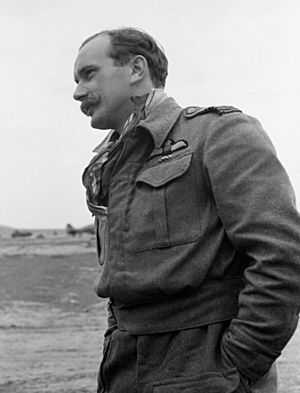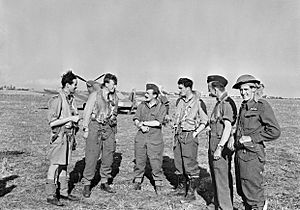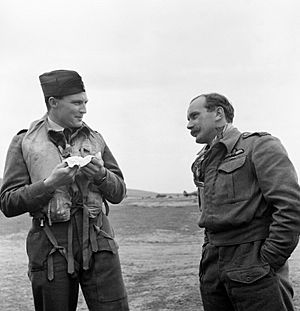Ronald Berry (RAF officer) facts for kids
Quick facts for kids
Ronald Berry
|
|
|---|---|

Berry, 1943
|
|
| Nickname(s) | 'Ras' |
| Born | 3 May 1917 Kingston upon Hull, United Kingdom |
| Died | September 2000 (aged 83) Hornsea, United Kingdom |
| Allegiance | United Kingdom |
| Service/ |
Royal Air Force |
| Years of service | 1939–1969 |
| Rank | Air Commodore |
| Commands held | No. 81 Squadron No. 322 Wing No. 543 Squadron |
| Battles/wars | Second World War |
| Awards | Commander of the Order of the British Empire Distinguished Service Order Distinguished Flying Cross & Bar |
Air Commodore Ronald Berry, CBE, DSO, DFC & Bar (born May 3, 1917 – died September 2000) was a brave British flying ace and a high-ranking officer in the Royal Air Force (RAF). He served during the Second World War and continued his career afterwards. During his time in the RAF, he was officially credited with shooting down at least 14 enemy aircraft. He also shared in the destruction of many more with other pilots.
Born in Kingston upon Hull, Ronald Berry joined the Royal Air Force Volunteer Reserve in 1937. He was called to serve in the RAF when the Second World War began. He joined No. 603 Squadron and flew many missions during the Battle of Britain. It was here that he achieved many of his first aerial victories. In 1941, he worked as a fighter controller at Turnhouse.
In early 1942, he took command of No. 81 Squadron. He led this squadron through the North African campaign from late 1942 to early 1943. In March 1943, he began leading No. 322 Wing. He then returned to the United Kingdom and spent the rest of the war in training and staff roles. After the war, he stayed in the RAF, serving in different positions with Fighter Command, Bomber Command, and the Air Ministry. He finished his military career in early 1969 as an air commodore. He retired to Hornsea and passed away in September 2000, at 83 years old.
Contents
Early Life and Joining the RAF
Ronald Berry was born on May 3, 1917, in Kingston upon Hull, United Kingdom. He attended Riley High School and then the Hull Technical Institute. After finishing his education, he worked for the Hull City Council.
In April 1937, he joined the Royal Air Force Volunteer Reserve. He learned to fly at No. 4 Elementary & Reserve Flying Training School in Brough Aerodrome. In early 1939, he spent three weeks with No. 66 Squadron, flying Supermarine Spitfire fighters. When the Second World War started, he was called up for full service.
World War II Heroics
Ronald Berry, known by his nickname 'Ras', started the war as a sergeant. He first went to a gunnery school. In mid-October 1939, he joined No. 603 Squadron. This squadron, part of the Royal Auxiliary Air Force, was based at Turnhouse and flew Spitfire planes.
About a month and a half after joining, Berry became a pilot officer. He was part of a group based at Montrose. On December 7, he spotted a Heinkel He 111 medium bomber and reported damaging it.
No. 603 Squadron stayed in Scotland for several months, flying patrol missions. On June 30, 1940, Berry damaged a Junkers Ju 88 medium bomber. Four days later, he helped destroy another Ju 88. On July 23, he and two other pilots destroyed a Dornier Do 17 medium bomber. A week later, he helped shoot down a He 111.
Battle of Britain: Defending the Skies
In August 1940, No. 603 Squadron moved south to Hornchurch. They joined No. 11 Group, which was heavily involved in the Battle of Britain. Berry flew many missions in late August and September.
On August 28, he likely destroyed one Messerschmitt Bf 109 fighter and damaged another near Dover. On August 31, he shot down two Bf 109s over Dover. Later that day, he destroyed another Bf 109 near Hornchurch. On September 1, he helped destroy a Bf 109 over Canterbury. The next day, he damaged another near Chatham. On September 9, he damaged a He 111. Two days later, he damaged a Messerschmitt Bf 110 heavy fighter south of London.
September 15 is known as Battle of Britain Day. The Luftwaffe launched a huge attack on southeast England. Berry probably destroyed two Bf 109s and shot down a Do 17. He likely destroyed another Bf 109 on September 17. On September 27, he shot down two Bf 109s over Gravesend, one shared with another pilot. He also likely destroyed another Bf 109 that day. At the end of September, Berry destroyed two more Bf 109s over Biggin Hill.
The Luftwaffe's attacks slowed down in October. For his bravery, Berry was awarded the Distinguished Flying Cross (DFC). The award was announced on October 25, 1940. The official statement said he had personally destroyed six enemy aircraft and helped destroy several others. It praised his courage and skill in leading his section.
Even with fewer attacks, the Luftwaffe was still active. On October 27, Berry damaged a Bf 109 near Dover. On November 7, he and three other pilots destroyed a Bf 110. The next day, he reported damaging a Heinkel He 113 fighter (which was actually a Bf 109). On November 17, he destroyed a Bf 109. On November 23, the Corpo Aereo Italiano (Italian Air Corps) attacked England. No. 603 Squadron, now flying Spitfire Mk IIa planes, intercepted them. Berry shot down one Fiat CR.42 Falco biplane fighter and likely destroyed a second.
In December, No. 603 Squadron moved back to Scotland. By this time, Berry had been promoted to flying officer. The next month, he became an acting flight lieutenant and led one of the squadron's flights. In April 1941, he left the squadron to become a fighter controller at RAF Turnhouse.
North Africa: Leading the Charge
In December 1941, Berry was promoted to acting squadron leader. In early 1942, he took command of No. 81 Squadron. This unit had just returned from serving in the Soviet Union. They were based at Turnhouse and flew Spitfire Mk Va fighters. They patrolled the North Sea but saw no action until May. Then, they moved south to Hornchurch to join the fighter wing there. They regularly flew missions to protect bombers over France and the Low Countries. They also flew fighter sweeps to try and draw out the Luftwaffe.
In October 1942, No. 81 Squadron moved to North Africa through Gibraltar. There, the pilots picked up Spitfire Mk Vcs. On November 8, the day of Operation Torch (the Allied invasion of French Algeria), they flew to the airfield at Maison Blanche. The next day, the squadron attacked Luftwaffe bombers over Oran. Berry shot down one Ju 88 and helped destroy another Ju 88 and a He 111. The squadron claimed 11 bombers destroyed in total.
Berry damaged a Ju 88 on November 11. Three days later, he damaged an Italian Macchi C.202 Folgore fighter. On November 26, over Bone, he damaged two Bf 109s. In the same area on November 28, he and another pilot destroyed a Bf 109. On December 3, he helped shoot down a Focke Wulf 190 fighter over Bone. On December 6, he destroyed a Fw 190 over Tebourba. On December 10, he shot down a Savoia-Marchetti SM.79 medium bomber.
On January 22, 1943, Berry became commander of No. 322 Wing, taking over from Petrus Hugo. On the last day of January, he destroyed a Bf 109 near Cap Rosa. He destroyed another Bf 109 on February 25 over Bone. On March 2, he was awarded a Bar to his DFC. That same day, he likely destroyed a Bf 109 over Mateur.
He damaged a Fw 190 on April 3, and a Junkers Ju 87 dive bomber on April 5. A week later, he engaged a Bf 109 near Enfidaville, which was likely destroyed. He damaged Bf 109s on April 25 and 26. On May 6, he caught and destroyed a Junkers Ju 52 transport aircraft on the ground. The next day, he destroyed six Bf 109s, all on the ground.
After the Tunisian campaign ended in mid-May 1943, Berry received the Distinguished Service Order (DSO) the following month. The official statement praised his great skill and leadership in North Africa. It also noted his excellent organizing ability, which helped his wing succeed. It stated that Wing Commander Berry had destroyed 17 enemy aircraft.
Later War Service
Berry returned to the United Kingdom and became an instructor. He then took courses at the Staff College and the Fighter Leaders' School. He finished the war there. By the end of the war, he was credited with shooting down 14 aircraft. He also shared in the destruction of 10 more. He likely destroyed 9 aircraft, damaged 17, and destroyed 7 on the ground.
Post-War Career
After the war, Berry helped set up the Central Fighter Establishment at Tangmere. He then became the station commander at Acklington. In 1946, he was appointed an officer of the Order of the British Empire. Later that year, he joined the headquarters of Fighter Command's No. 12 Group in a staff role. In 1947, he became commander of the Air Fighting Development Squadron.
On July 1, 1952, he was promoted to wing commander. He later went on an exchange program with the United States Air Force. He was based at the Air Proving Ground in Florida.
When he returned to the UK, Berry took a staff job at Fighter Command. After attending the Joint Services Staff College in 1954, he moved to Wittering. There, he became Wing Commander Flying for Vickers Valiant jet bombers. He was later given command of No. 543 Squadron, which he led until 1959. He was promoted to group captain and took on staff positions at the Air Ministry and then Bomber Command.
In 1965, he was appointed Commander of the Order of the British Empire (CBE). In January, he was part of the RAF group at the funeral of former prime minister Winston Churchill. Later that year, he returned to a command role at Lindholme. He was promoted to air commodore in early 1966. His final years of military service were spent in charge of operations at the Board of Trade.
Later Life and Legacy
Ronald Berry retired from the RAF on January 29, 1969. He settled in Hornsea to care for his wife, whom he had married in September 1940. She was very ill. He passed away in September 2000.
In 2014, his medals were sold for £120,000. These included his CBE, DSO, DFC and Bar, along with other service medals. The following year, a plaque was placed in his memory at Kingston upon Hull's Guildhall. This was where he had worked before the Second World War.



